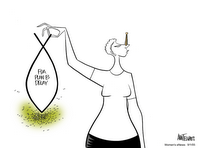FDA faces more questions on Plan B

The FDA faces more questions on Plan B Attorneys for a New York women's group plan to grill Food and Drug Administration officials this week about their failure to decide whether an emergency contraceptive pill called Plan B may be sold without a prescription.
Former FDA Commissioner Lester Crawford, Dr. Janet Woodcock, deputy operations commissioner, and Dr. Steven Galson, director of the FDA's drug evaluation center, are to testify in court-ordered depositions to be taken by attorneys for the Manhattan-based Center for Reproductive Rights Wednesday through Friday in Washington, D.C., and Rockville, Md.
The women's group seeks to force approval of over-the-counter sales of Plan B, which can prevent pregnancy if taken within 72 hours after unprotected intercourse.
Simon Heller, one of the attorneys, plans to quiz Woodcock on a March 23, 2004, staff memo suggesting she was concerned Plan B might lead to teenage promiscuity.
The FDA is only supposed to consider the safety and efficacy of drugs.
In the memo released by the FDA, Dr. Curtis Rosebraugh, an agency medical officer, wrote: "As an example, she [Woodcock] stated that we could not anticipate, or prevent extreme promiscuous behaviors such as the medication taking on an 'urban legend' status that would lead adolescents to form sex-based cults centered around the use of Plan B."
Rosebraugh indicated he found no reason to bar nonprescription sales of Plan B.
"This was the level of scientific discourse," Heller said in an interview, referring to concerns attributed to Woodcock. "I find it very odd that these people who are supposed to be responsible scientists and doctors are making up wacky reasons."
Assistant U.S. Attorney Franklin Amanat, who represents the FDA, had no comment. FDA spokeswoman Susan Bro said, "It is against FDA policy to comment on pending litigation."
Conservative groups contend Plan B causes abortions and have lobbied against nonprescription sales. The manufacturer, Barr Laboratories of Pomona, N.Y., says it simply prevents pregnancy.
The FDA rejected Barr's application for Plan B nonprescription sales in May 2004. On May 6, 2004, Galson, now head of the FDA drug center, wrote in a memo: "Some staff have expressed the concern that this decision is based on non-medical implications of teen sexual behavior ... These issues are beyond the scope of our drug approval process, and I have not considered them in this decision."
In January 2005, the Center for Reproductive Rights sued the FDA in federal court in Brooklyn on behalf of two advocacy organizations and nine women from a group called the Morning-After Pill Conspiracy. The lawsuit alleges the FDA ignored a statutory deadline for a Plan B decision.
Last August, the FDA said it needed more time to consider a revised application from Barr to allow Plan B sales without a prescription to women 16 and older but with a prescription to girls 15 and younger. Dr. Susan F. Wood, the FDA's top women's health officer, then resigned in protest over the repeated delays.
In September, Dr. Frank Davidoff, editor emeritus of the Annals of Internal Medicine, resigned as consultant to the FDA's Nonprescription Drugs Advisory Committee - also over the Plan B issue. Davidoff served on the panel when it recommended over-the-counter sales of Plan B in 2003 - advice the FDA, in a rare move, did not follow.
In November, the Government Accountability Office said the FDA decided not to approve nonprescription sales of Plan B even before agency medical officers finished reviewing it. A group including Sen. Hillary Rodham Clinton had requested the investigation of the FDA's handling of Plan B.

0 Comments:
Post a Comment
<< Home